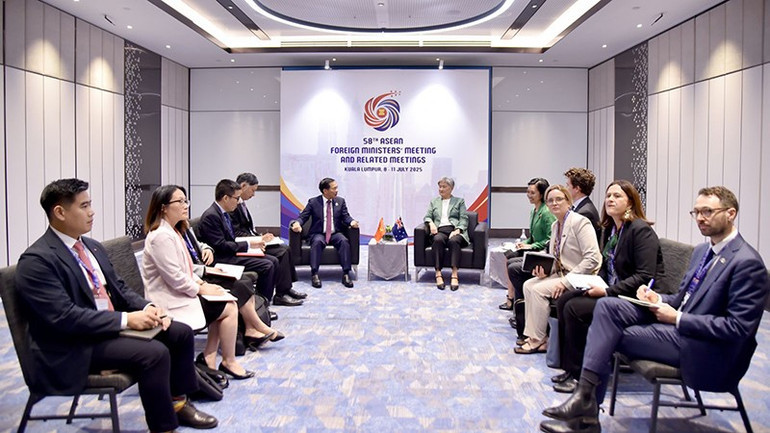On July 10, during the 58th ASEAN Foreign Ministers’ Meeting and related events in Kuala Lumpur, Malaysia, Deputy Prime Minister and Foreign Minister Bui Thanh Son held bilateral talks with Chinese Foreign Minister Wang Yi and Australian Foreign Minister Penny Wong.

Vietnamese Foreign Minister Bui Thanh Son and Chinese Foreign Minister Wang Yi. (Photo: Ministry of Foreign Affairs of Vietnam)
In his meeting with Chinese Foreign Minister Wang Yi, the two sides engaged in a comprehensive and substantive discussion on bilateral relations and international and regional issues of mutual interest. The dialogue took place in a candid and friendly atmosphere.
Minister Wang Yi congratulated Vietnam on its successful government restructuring and preparation for the upcoming 14th National Party Congress.
Both ministers reaffirmed the strategic importance of the Vietnam–China relationship in each country's foreign policy. They expressed satisfaction with the growing and positive momentum of bilateral ties, particularly the increasingly frequent and effective high-level exchanges, enhanced people-to-people interactions, and expanding local cooperation - contributing to deepening political trust and fostering a strong, friendly neighborly relationship for mutual benefit.
They stressed the need for effective coordination and implementation of high-level agreements to ensure healthy, stable, and sustainable bilateral development.
The two sides agreed to maintain regular high-level exchanges and prepare for key diplomatic activities in late 2025. They committed to strengthening cooperation mechanisms, including the upcoming 17th session of the Vietnam–China Bilateral Cooperation Steering Committee.
They also agreed to concretize existing agreements in priority areas such as strategic transport connectivity - with a focus on rail links - enhancing the efficiency of working groups, promoting innovation, and closely coordinating on border management and building a peaceful, cooperative border region.
On maritime issues, both sides underscored the importance of seriously implementing the high-level agreements and common understandings of both Parties and countries. They also reaffirmed their commitment to fully and effectively implementing the Declaration on the Conduct of Parties in the East Sea (DOC), while working with ASEAN to accelerate substantive negotiations toward an effective, legally binding Code of Conduct (COC), consistent with international law and the 1982 United Nations Convention on the Law of the Sea (UNCLOS).
Expanding Vietnam–Australia strategic partnership
Later the same day, Deputy Prime Minister Bui Thanh Son met with Australian Foreign Minister Penny Wong.
The two ministers expressed satisfaction with the growing substance and positivity of the Vietnam–Australia Comprehensive Strategic Partnership. They agreed to coordinate closely in preparing for upcoming high-level visits and the 7th Foreign Ministers’ Meeting to be held in Vietnam.
Both sides emphasized the importance of a free, open, and rules-based multilateral trading system under the World Trade Organization (WTO) and agreed to enhance cooperation in overcoming trade barriers, expanding market access, and leveraging multilateral trade mechanisms and agreements where both countries are members.
Minister Bui Thanh Son proposed stronger cooperation under the existing MoU on labor in the agricultural sector and suggested advancing discussions toward an MoU on the digital economy. He also encouraged Australia to increase its skilled labor quotas for Vietnamese workers in healthcare, tourism, and IT, and to facilitate Vietnamese student enrollment in Australian institutions.
Minister Penny Wong affirmed that Vietnam is a key regional partner for Australia. She expressed commitment to working closely with Vietnam on regional and international strategic issues and sharing expertise in green transition, carbon markets, digitization, and emerging technologies.
On regional and global issues, Minister Bui Thanh Son acknowledged Australia’s active contributions to Southeast Asia, especially on the South China Sea. He encouraged stronger collaboration between Australia and Mekong subregion countries to support sustainable development.
Both sides reaffirmed their commitment to international law and a rules-based regional order - contributing to peace, stability, and cooperation regionally and globally.
PV